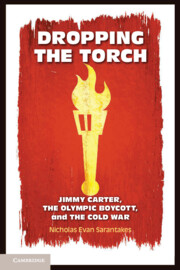Book contents
- Frontmatter
- Contents
- Acknowledgments
- Abbreviations
- Introduction Miracle on Ice
- Chapter 1 Lord Killanin and the Politics of the Olympics
- Chapter 2 Los Angeles versus Moscow
- Chapter 3 Jimmy Carter and U.S.-Soviet Relations
- Chapter 4 The Soviet Invasion of Afghanistan
- Chapter 5 The American Response
- Chapter 6 Easy Victories
- Chapter 7 Painful Losses
- Chapter 8 The White House Games
- Chapter 9 Coca-Cola, NBC, and the Defeat of the Iron Lady
- Chapter 10 The Vote in Colorado
- Chapter 11 Civil Wars
- Chapter 12 Carter versus Killanin
- Chapter 13 Moscow: The Olympics Are the Olympics
- Chapter 14 Los Angeles
- Chapter 15 Conclusion
- Epilogue
- Notes
- Bibliography
- Index
Chapter 12 - Carter versus Killanin
Published online by Cambridge University Press: 05 September 2012
- Frontmatter
- Contents
- Acknowledgments
- Abbreviations
- Introduction Miracle on Ice
- Chapter 1 Lord Killanin and the Politics of the Olympics
- Chapter 2 Los Angeles versus Moscow
- Chapter 3 Jimmy Carter and U.S.-Soviet Relations
- Chapter 4 The Soviet Invasion of Afghanistan
- Chapter 5 The American Response
- Chapter 6 Easy Victories
- Chapter 7 Painful Losses
- Chapter 8 The White House Games
- Chapter 9 Coca-Cola, NBC, and the Defeat of the Iron Lady
- Chapter 10 The Vote in Colorado
- Chapter 11 Civil Wars
- Chapter 12 Carter versus Killanin
- Chapter 13 Moscow: The Olympics Are the Olympics
- Chapter 14 Los Angeles
- Chapter 15 Conclusion
- Epilogue
- Notes
- Bibliography
- Index
Summary
The boycott seemed to be over. The positions of most national Olympic committees were made clear several days before the formal deadline, and while these battles took place largely in public, Carter and Killanin worked behind the scenes to gain an advantage before the public climax. These efforts brought about the only face-to-face meeting of these two presidents and also, more importantly, showed the limitations of both men’s leadership.
While various factions battled across the planet, the IOC Executive Board met in Switzerland. The big issue it faced during three days of talks was should it penalize the American Olympians. According to Killanin, Carter’s boycott was “a clear case of political interference and, unless the USOC rebuffed it, we could move towards taking action against the committee, and that in turn would affect the Los Angeles Games in 1984.” Killanin, though, realized such an action would be counterproductive. Having the Olympics in Los Angeles without the United States being allowed to compete was a recipe for disaster. “I am doing all I can to protect the USOC,” he warned Kane.
- Type
- Chapter
- Information
- Dropping the TorchJimmy Carter, the Olympic Boycott, and the Cold War, pp. 214 - 225Publisher: Cambridge University PressPrint publication year: 2010

